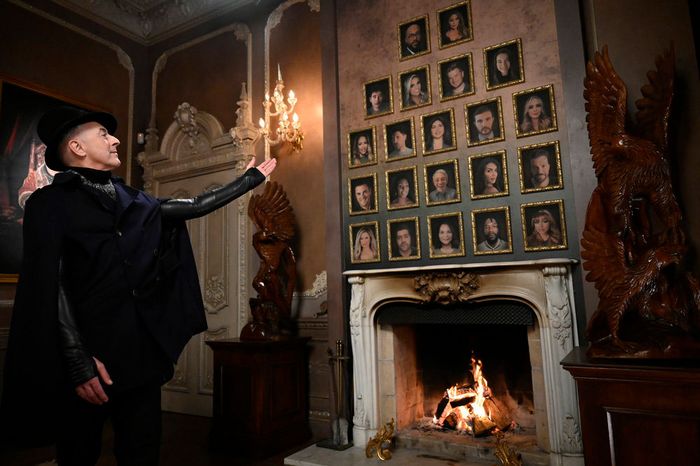
The Traitors made its return trip to Scotland last week, and while the new season pretty much runs everything back (even Kate Chastain?!), the redux does feature one significant difference. Where the debut U.S. season was split evenly between reality stars and ordinary people, season two jettisons all the normies in favor of wall-to-wall Whos. Gone are the yoga instructors, the DMV managers, the directors of music services so that more space can be left open for … former British politicians?
Here’s the thing: Reality-television stars are a kind of demigod. They are tragedy, they are triumph, they are human drama exaggerated to an operatic degree. More to the point, they’re just different from normal people. Monica Saltburning everyone else on RHOSLC? That’s Greek pantheon shit. In that sense, The Traitors is grand mythological theater. We’re talking about a show that convenes a group of reality vets to do classic reality-television things: deceive, maneuver, and coalition-build their way to a big pot o’ gold.
Now, one of the more interesting things you can do with demigods is emphasize the nature of their difference, and one of the best ways to do that is by throwing a bunch of mere mortals around them. That’s what struck me as so conceptually interesting about the first season’s normie-celebrity mixing, even if, admittedly, the show never exploited that juxtaposition to its fullest potential. It was still genuinely fascinating to watch normies try to match up against seasoned reality players and attempt their own ascent into the pantheon. Of course, the effort was disastrous in that they uniformly failed. Christian de la Torre, the lone normie Traitor that season, was barely capable of keeping a straight face, let alone maintaining any form of deception. Every other normie, mostly underdeveloped in the edits, proved to be little more than cannon fodder. Quentin Jiles, the political analyst, had a nonexistent hit rate. His complete failure to play the game was incredible to behold.
Nevertheless, the presence of normies enriched the text. Let’s not forget the first season culminated in a final four that was evenly split between reality stars — former Bachelor Arie Luyendyk Jr. and Survivor legend Cirie Fields — and two normies, the aforementioned Quentin and Andie Vanacore. Let’s also not forget that Cirie’s endgame move — subtly turning on Arie to claim the entire pot for herself while simultaneously solidifying her deception as a Faithful — was pure reality television, and its greatness was further accentuated by the presence of Quentin and Andie, whom Cirie basically dragged into the finals to alternately serve as shield, ammunition, and straw votes. When her betrayal was revealed, they could only respond as both audience surrogates and collateral in the most human way possible: utter disbelief from Quentin, utter devastation from Andie. What a moment! For the most part, the reality vets on The Traitors are people who know the score. They have fundamentally internalized not just the public performance of being on reality television but also the cold game of the entire enterprise. Quentin and Andie were not people who knew the score. They were mortals who flew too close to the reality-television sun and were scorched for their efforts.
To be clear, season two’s normie purge has not been a deal-breaker. The inclusion of Survivor’s Parvati Shallows, a tremendous stone-cold killer, is on its own more than worth the price of admission. More broadly, not all reality stars are created equal, and this leads to a dynamic somewhat reminiscent of the normie-celebrity divide. Love Island USA’s Carsten “Bergie” Bergersen has all the makings of an innocent. Bachelor alum Peter Weber has thus far been so characteristically passive he’s basically a nonfactor. What is Bling Empire’s Kevin Kreider even doing there, other than hanging out and vibing? This leads to an intriguing tension between different kinds of reality-television heritages that the show seems eager to explore. Even by this point, three episodes in, the stars from franchises grounded in social-strategic competition (Survivor, Big Brother, The Challenge) are playing at a whole different level compared to those from the Real Housewives universe, who pretty much are limited to defensive crouches. The Traitors’ construct obviously advantages the former, and you can feel everyone else organizing around the theory of that threat.
While there aren’t any true normies, there are arguably a few players who still occupy normie-adjacent positions. Deontay Wilder and John Bercow code as relatively normal people despite their extraordinary professions. Being a pro boxer or a British politician is tough and all, but it’s still different from “reality-television personality.” This notion was already established in the first season by Olympian Ryan Lochte, who straddled a curious line of being celebrity in theory but a normie in practice. In any case, these people are already media creations of a sort. They’ve previously signed a compact with the cruel gods of fame. So when they inevitably get got, whether by murder or banishment, it won’t carry the same feeling of tragedy as seeing a civilian pounded into dust.
All of which drives us toward another grand operatic possibility we’ve been robbed of by the normie purge: the chance to see a mere mortal rise to meet the moment, lay waste to the gods, and win the whole damn thing, thus successfully crossing over into reality stardom themselves. Now that’s Greek pantheon shit, and a truly pleasurable reminder that the line between normal people and reality stardom is more porous than you’d think. Being a reality-television character is hard, but it’s still infinitely attainable. Look around: Future reality demigods walk among us all the time. Bring back the normies!


